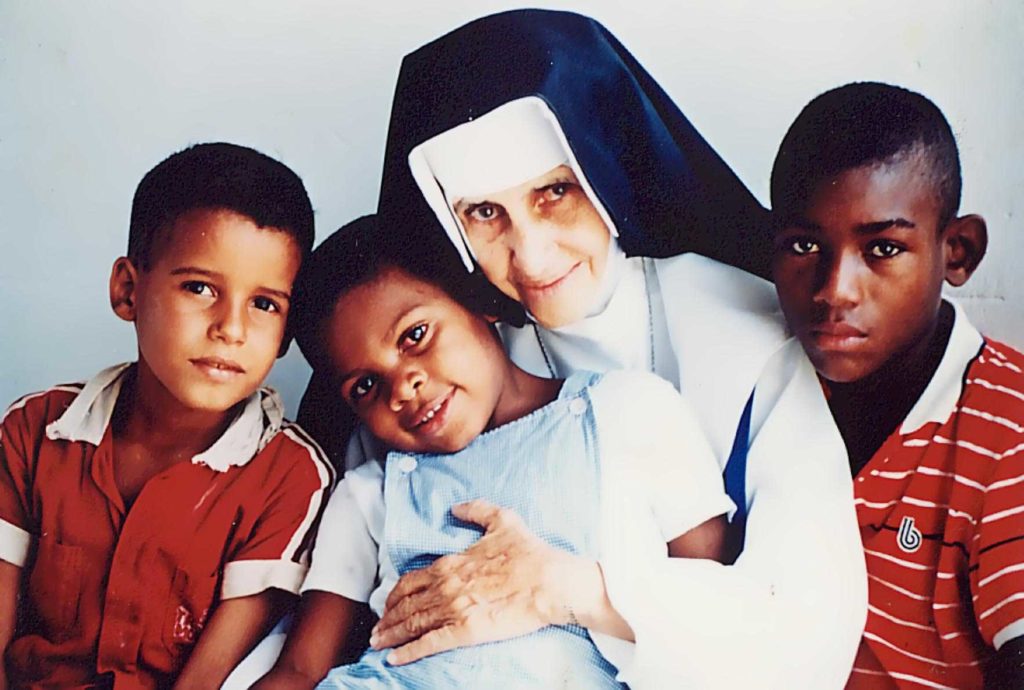The first Brazilian to reach the altars in 1991 was Mother Pauline of the Agonizing Heart of Jesus. St. John Paul II said then in his homily a phrase that has become memorable: "Brazil needs saints, a lot of saints! Since then, numerous children of the Terra da Santa Cruz, original name of Brazil, have been beatified and canonized.
St. Pauline (1865-1942) was a native of Vigolo Vattaro, Trento, Italy, but her family became Brazilian when she was about ten years old. In the city of Nova Trento, State of Santa Catarina, where today there is a large and beautiful shrine in her honor, she founded the Congregation of the Sisters of St. Pauline. Irmãzinhas da Imaculada Conceiçãodemonstrating heroic patience, humility, and obedience..
However, the first women actually born in Brazil to be canonized born in Brazil who were canonized are five anonymous martyrs from the group of 30 comrades of 30 companions massacred by Tapuias and Potiguares Indians, associated with Dutch Calvinist soldiers soldiers who had settled in the State of Rio Grande do Norte. Norte.
The dreadful massacre massacre to purge the Catholic population, which led to the cruel death of nearly 150 people, began during a Mass celebrated of 150 people, began during a Mass celebrated on July 16, 1645 by the parish priest of Cunhaú, Santo André de Soveral, and ended three days later. the parish priest of Cunhaú, Santo André de Soveral, and ended three months later in three months later in Uruaçu, where Saint Mateus Moreira exclaimed, as his heart was ripped out by the coasts: "¡Praise be to the Blessed Sacrament!".
Among the Brazilian protomartyrs were the Portuguese St. Ambrósio, the Castilian St. Antonio Vilela Cid and the Navarrese St. Juan Lostau. At that time, Brazil was still a land of conquest and its first inhabitants, migrants and natives - indigenous, Europeans and Africans - still were just the seeds of the future nation.
Beloved and revered in Brazil
But on Sunday, October 13, Pope Francis will canonize a modern-day Brazilian woman, Maria Rita de Souza Lopes Pontes (1914-1992).known by her religious name as Sister Dulce de los Pobres.
Always more loved and venerated in Brazil, Irmã Dulce She was a native of Salvador de Bahia and was moved by the suffering of the poor. to the needy with heroic apostolic charity, until she became a nun in 1934. 1934. She was inspired by the little way of St. Therese and, with God's grace, she accomplished great works, despite her father's encouragement. God, she accomplished great works, in spite of her frail health: she founded schools, libraries libraries, an extensive network of hospitals and health centers for the poorest, among other initiatives. among other initiatives.
In order to In order to perpetuate his work, he created in 1984 a public association of the faithful of diocesan right, with statutes approved by the archbishop of Salvador diocesan right, with statutes approved by the archbishop of Salvador: the Daughters of Mary, Servants of the Poor. She was nominated for the Nobel Peace Prize in 1988. Nobel Peace Prize in 1988. St. John Paul II visited her in the hospital in October 1991, a few months before her death October 1991, a few months before her death, which occurred on March 13, 1992. March 13, 1992, which caused great commotion in the country. in the country. According to Don Murilo Krieger, Archbishop of Salvador and Primate of Brazil, his canonization, the first of his kind in the world, will be celebrated on March 13, 1992. Brazil, his canonization, the third fastest in the recent history of the Church, caused great commotion in the country. history of the Church, "will be an honor for Brazil and at the same at the same time a commitment. God is telling us: it is possible to be saints!
The lives of these exemplary Christians - patient in the face of adversity and zealous in the face of the needs of others - confirm the motto of St. John Paul II: not only Brazil, but the Church and the whole world need saints. The Church will never have enough saints because, although the Gospel is the same, places and times are always changing. New situations and environments propose new challenges and demand creativity in living the message of Jesus Christ.
In this way, the Holy Spirit raises up in every region and in every age new paths to holiness and in every epoch new paths to holiness and gives to generous Christians the graces the graces necessary for the journeys. God wants all men to be saved God wants all men to be saved, and for this very reason it is possible to sanctify oneself in all circumstances of life. life. The saints are, therefore, palpable and ever-present examples, whose strength before God brings the Christian people to the Christian people devoutly entrust themselves to them in search of help and intercession seeking help and intercession. The efficacy of the lives of the saints makes them universal and a reference universal, as well as a reference for Christians everywhere. Through the lives of the saints, the universal call to holiness is the universal call to holiness, as proclaimed by St. John Paul II on that not so distant 18th II proclaimed on that not so distant October 18, 1991: "Once again I say to you: Brazil needs saints, many saints! Brazil needs saints, many saints! Holiness is the clearest proof, of the vitality of the Church in all times and in all places. and in all places.











